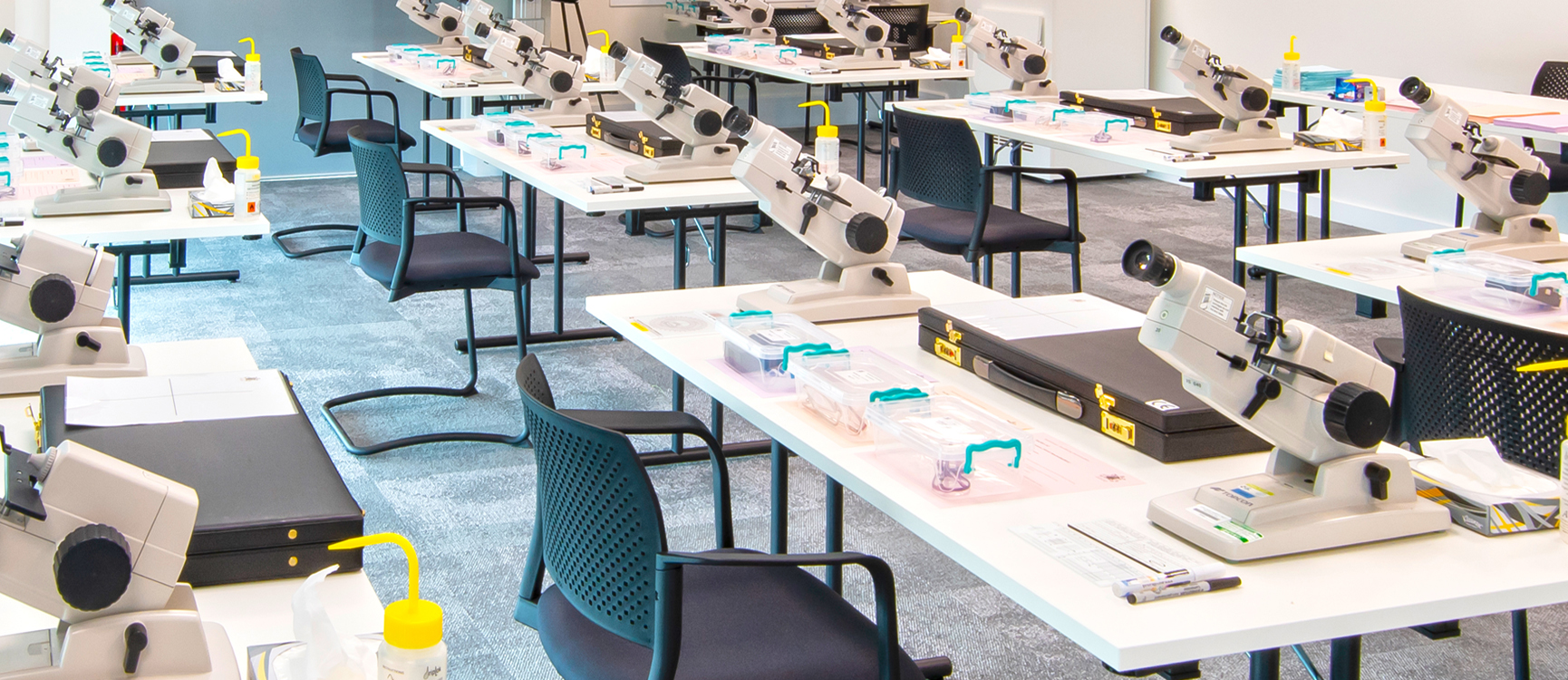
Advanced qualifications
If you have already attained the Certificate in Contact Lens Practice why not use the experience you have gained to develop to the next level – and start the process by taking one of the units which relates to everyday practice, like toric lenses or presbyopic correction?
The syllabus is in five units:
- Unit A – Toric lenses: The first part of the unit involves designing an RGP toric lens empirically, assessing the fit of a RGP toric lens and carrying out an over-refraction on a toric patient. The second part then involves the assessment of toric soft fittings using media technology.
- Unit B – Presbyopic correction: This unit requires the selection and assessment of a pair of multi-focal lenses including the choice of final powers – and discussion of the principles related to presbyopic correction.
- Unit C – Remedial fittings: The format in this unit is one dissertation and one viva section – discussing the etiology, topography, CL options, challenges, management and aftercare involved in [i] refractive treatment and orthokeratology and [ii] medical/therapeutic indications including such as keratoconus, keratoplasty and bandage lenses.
- Unit D – Current knowledge: This unit is a short answer questions examination paper with open and closed questions on current contact lens materials, lens designs and care products.
- Unit E – Case records: 12 case records are presented before the examination, to meet a specified list of cases which includes high prescriptions, extended/continuous wear, RGP and soft torics, multi-focal correction of presbyopia, and problem solving – plus an interesting case of the candidate’s choice. The examination is a viva on the presented records.
Candidates can choose the order in which the five units are taken and if singly, small groups or in total. The only requirement is that they are all sat within a three year period and passed within five years of the first unit examination. Successful completion of the assessments will result in the award of the Diploma in Advanced Contact Lens Practice, permitting the use of the letters FBDO (Hons) CL.
Copies of the syllabus are available here.
This in-depth course on the design and performance of lenses is of interest to all qualified opticians who dispense spectacle lenses. Written by Professor Mo Jalie, the course deals with the more advanced aspects of geometric optics of ophthalmic lenses and the principles of modern spectacle lens design.
Completely updated to include the theory and design of aspheric lenses, the course includes advanced consideration of paraxial theory as well as the calculation of the off-axis performance of lenses and the significant aberrations which must be eliminated or minimised in spectacle lens design.
Entry requirements
Participants should normally have studied ophthalmic lens theory up to final year level of a course in ophthalmic dispensing or hold a degree in either Ophthalmic Dispensing or Optometry, or the FBDO qualification of the Association of British Dispensing Opticians.
The course would also be of interest to technicians in the ophthalmic optical industry who are eligible to undertake the course if they hold either an HND or a degree in a science or engineering-based subject, or the full SMC(Tech) Certificate from the Worshipful Company of Spectacle Makers and have studied mathematics up to about A-level standard.
An introductory course in ophthalmic lens theory is available to those who have not already undertaken one of the courses mentioned above.
Mode of learning
For those applicants who are familiar with word processing and the use of a drawing package, the course can be undertaken entirely via the internet as an e-Learning course. It can also be undertaken as a normal paper-based distance learning course, when the weekly assignments would be submitted by post.
Duration of course
The course is designed to be run over 32 weeks, but this period may be extended if circumstances require. Those who complete the course may undertake the Association of British Dispensing Opticians‘ Honours Examination in Spectacle Lens Design, success in which leads to the qualification, ABDO(Hons) SLD. If the candidate already holds the qualification FBDO, they will be granted the suffix FBDO (Hons) SLD. These Honours examinations are normally held in December of each year for candidates who commence in January, or in June of each year for candidates who commence in September.
Registration
To register for the course, please complete the application form in ‘documents’, below, and return it together with the course fee outlined on the form to :
Professor M Jalie
61 Chestnut Drive
Hassocks
West Sussex
BN6 8AZ
Telephone enquiries +44 (0) 1273 844681
e-mail enquiries mojalie@aol.com
Details of ABDO Honours examinations from:
The Association of British Dispensing Opticians
ABDO College of Education
Godmersham Park Mansion
Godmersham
Canterbury
Kent CT4 7DT
Telephone enquiries +44 (0) 1227 73 88 29
Fax +44 (0) 1227 73 39 00
e-mail enquiries education@abdo.org.uk
This course will enable practitioners to develop advanced skills and knowledge in different aspects of paediatric eyecare, including myopia management.
There will be 10 units in total. 9 units are delivered online as recorded lectures, and 1 unit is a practical in-person assessment to be offered 4 times per year at the ABDO National Resource Centre in Birmingham.
These units are:
- Unit 1 – Advanced communication and psychology
- Unit 2 – Paediatric dispensing
- Unit 3 – Facial development and research data
- Unit 4 – Refractive management
- Unit 5 – Neurodiversity and learning differences
- Unit 6 – Interventions
- Unit 7 – Specialist care
- Unit 8 – Paediatric low vision
- Unit 9 – Paediatric common eyecare conditions and acute presentations
- Unit 10 – Practical assessment
Each theoretical unit will have a MCQ assessment and be CPD accredited.
The course and exam fee is £1500 for ABDO members and is £1850 for non-members.
Applications open 10 October 2024